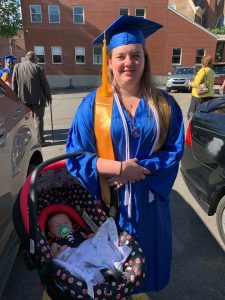With tape to mark their desks and plenty of space between them, masked-up students returned to face-to-face classes at Spalding University on Monday and Tuesday for the first time since March.
Students said it was great to see their friends’ faces again – even if it was only the top half of those faces – and resume the in-person courses that they’d missed.
“I love being in in-person classes,” sophomore nursing student Samantha Roberson said. “I hope it continues, and I think it will continue if people keep wearing their masks like they should be and have been.”
When Roberson and fellow nursing students Erica McMann and Claire Houck arrived at their anatomy and physiology lecture class at the Egan Leadership Center’s Troutman Lectorium on Monday, at least every other chair was removed from the rows of long tables, with tape marking the spaces where they could sit.
“It was a little bit weird to get used to it at first,” Houck said, “but we’re supposed to be in class, not gathered and talking anyway, so it was nice.”
Fully in-person classes make up about 20 percent of the course sections at Spalding this session. The University is providing both in-person options and an array of fully or partially remote classes. The result is to accommodate students who want or need a traditional on-campus learning experience – especially in lab and hands-on courses – while keeping the overall density of people on campus low during the pandemic. Spalding has also expanded and enhanced its remote learning programs and technology in recent months and years.
The three nursing students said some of their classmates joined the class home, watching on an web stream that is available for every in-person course at Spalding this session.
“I thought that was cool,” Houck said.
HEALTHY TOGETHER AT SPALDING
- What you need to know about the fall semester
- Healthy Together home page
- Return to Campus Plan
- Health and Wellness information
- Campus Updates
Houck, McCann and Roberson said the lab portion of their anatomy and physiology course has been divided into two groups. Half of the students meet in person one day, while the other half meets online. The next day, the groups swap.
Houck, McMann and Roberson all also live in the Spalding Suites. They said they preferred the expanded move-in period from last weekend. Returning students moved into the Suites by appointment over two days instead of one day in years past.
MOVE-IN 2020 | Residential students bring ‘renewed energy’ to campus
They said they had not encountered anyone on campus who was not wearing a mask or keeping a safe six-foot distance from other people.
“If everyone continues to do what they need to do to keep themselves and their community safe and healthy, we’ll all be just fine,” Houck said.
Another group of nursing students – those in Spalding’s accelerated BSN (second degree) program – had their first-ever day of on-campus classes on Monday at the Republic Bank Academic Center.
“I do feel safe, and I love the fact that Spalding (has) the flexibility but also the standards that they are enforcing like this is a real thing,” student Melissa Davis said. “‘Everybody follow the precautions. Everybody does their own part.’ And then I also feel like I won’t be penalized if I get sick.”
“It’s chilled out having your own table in a big space. Anxiety is definitely down.”
All the students interviewed on Monday said they had completed the #CampusClear health assessment before arriving on campus. That, along with wearing masks and staying socially distant and agreeing to the Spalding Promise pledge, is a key tenet of Spalding’s Return to Campus plan.
The app “is really easy to navigate,” second-degree BSN student Brittanie Glasser said.
Second-degree BSN student Craig Blasi, who previously attended a large public university, said he is already enjoying the small class sizes at Spalding.
“It’s a good family atmosphere,” he said. “I just met all my classmates today, and we’re all really close already. (At the larger university), it wasn’t bad; it was just big. I didn’t feel as included as I do here.”
